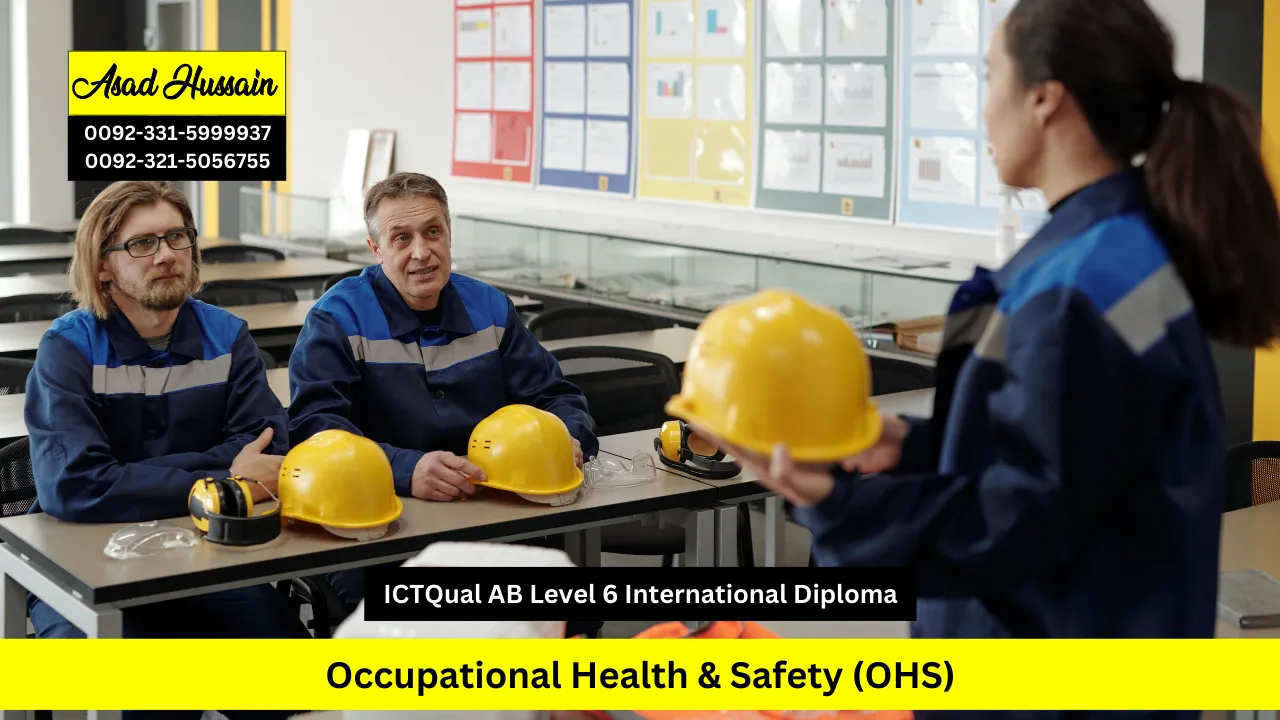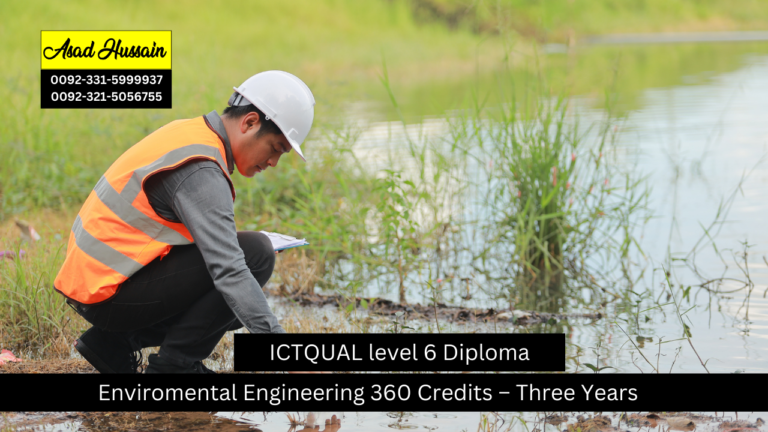Occupational health and safety (OHS) is a critical aspect of modern workplaces, ensuring the well-being of employees while enhancing organizational productivity. The ICTQual AB Level 6 International Diploma in Occupational Health & Safety (OHS) provides learners with advanced knowledge, practical skills, and professional expertise to manage workplace risks, implement safety standards, and foster a culture of health and safety across industries.
ICTQual ABLevel 6 International Diploma in Occupational Health & Safety (OHS) covers occupational safety legislation, risk assessment, hazard control, emergency preparedness, ergonomics, and environmental health management. Learners gain hands-on experience in identifying hazards, developing safety protocols, conducting audits, and applying best practices to maintain safe and compliant work environments.
The ICTQual AB Level 6 International Diploma in Occupational Health & Safety (OHS) emphasizes practical applications through case studies, simulations, and project-based learning, enabling learners to implement real-world solutions in diverse industries. Graduates are prepared for leadership and advisory roles in health and safety management, regulatory compliance, and organizational risk control, across corporate, industrial, and governmental sectors.
Upon successful completion, learners receive a British Council verifiable, MOFA and Embassy attestable certification, recognized globally. This credential enhances professional credibility, employability, and career advancement opportunities in occupational health and safety.
Program Highlights
Study Units
Year 1 – Foundation of Industrial Safety & Risk Management
- Principles of Industrial Safety Management
- Introduction to Risk Management in Industrial Environments
- Occupational Health and Industrial Hygiene Fundamentals
- Workplace Hazard Identification and Control Measures
- Safety Legislation and Regulatory Compliance
- Fire Safety and Emergency Preparedness
- Manual Handling and Ergonomic Safety
- Communication and Reporting in Safety Management
- Environmental Safety and Sustainability
- Electrical and Mechanical Safety Awareness
- Incident Investigation and Root Cause Analysis
- Professional Ethics and Responsibility in Safety Practice
Year 2 – Applied Industrial Safety & Risk Management
- Advanced Risk Assessment and Hazard Control
- Safety Performance Monitoring and Auditing
- Process Safety Management and Hazardous Substances
- Industrial Safety in Manufacturing and Heavy Industries
- Safety Management in Construction and Energy Sectors
- Occupational Diseases and Preventive Measures
- Behavioural Safety and Human Factors
- Safety Culture Development and Change Management
- Safety Technology and Digital Tools
- Emergency Response Planning and Crisis Management
- International Legal and Regulatory Frameworks
- Research Methods and Data Analysis for Safety Management
Year 3 – Strategic Leadership in Industrial Safety & Risk Management
- Strategic Safety Leadership and Governance
- Integrated Management Systems (ISO 45001, ISO 14001, ISO 9001)
- Business Risk Management and Sustainability
- Advanced Occupational Health & Wellbeing Strategies
- Safety in Large-Scale Industrial Projects
- Corporate Social Responsibility and Ethical Safety Practices
- International Standards and Global Safety Frameworks
- Digital Transformation and Emerging Trends in Safety
- Policy Development and Implementation in Safety Management
- Research Project / Dissertation in Industrial Safety
- Professional Development and Lifelong Learning
- Capstone Project: Practical Application of Safety Leadership
To ensure learners are fully prepared for the Level 6 diploma, the program has specific entry requirements covering age, education, professional experience, and language proficiency.
Age Requirements
- Candidates must be 18 years or older at the time of enrollment in ICTQual ABLevel 6 International Diploma in Occupational Health & Safety (OHS).
- Mature learners with relevant workplace or safety experience may also be considered.
Educational Requirements
- Completion of a Level 5 Diploma or equivalent in Occupational Health & Safety, Environmental Health, or a related field.
- Applicants with a bachelor’s degree in Safety, Health, Environmental Management, or Engineering are eligible.
Professional Experience
- Minimum 1–2 years of experience in health, safety, or related operational roles is recommended.
- Practical exposure to risk assessment, safety audits, or regulatory compliance is advantageous.
English Language Proficiency
- Demonstrated proficiency in English equivalent to IELTS 5.5 or higher.
- Ability to understand technical terminology, follow instructions, and engage in academic and practical learning is essential.
The ICTQual AB Level 6 International Diploma in Industrial Safety & Risk Management provides learners with advanced knowledge, practical competencies, and strategic leadership skills necessary to manage workplace safety, mitigate industrial risks, and ensure compliance with regulatory standards. The ICTQual AB Level 6 International Diploma in Occupational Health & Safety (OHS) combines theoretical foundations, applied practices, and leadership principles to prepare learners for senior roles in diverse industries.
Year 1 – Foundation of Industrial Safety & Risk Management
Principles of Industrial Safety Management
- Understand the fundamental principles and frameworks of industrial safety.
- Apply safety management techniques to reduce workplace hazards.
- Assess safety program effectiveness using measurable criteria.
Introduction to Risk Management in Industrial Environments
- Identify hazards and potential risks in industrial settings.
- Apply risk assessment methodologies to control and mitigate risks.
- Evaluate risk control effectiveness using measurable outcomes.
Occupational Health and Industrial Hygiene Fundamentals
- Understand occupational health principles and hygiene practices.
- Apply preventive strategies to protect worker health.
- Assess workplace health outcomes using measurable indicators.
Workplace Hazard Identification and Control Measures
- Identify chemical, physical, and biological workplace hazards.
- Implement control measures to minimize risk exposure.
- Evaluate mitigation strategies using measurable standards.
Safety Legislation and Regulatory Compliance
- Recognize national and international safety laws and regulations.
- Apply compliance strategies to ensure operational adherence.
- Assess compliance effectiveness using measurable performance metrics.
Fire Safety and Emergency Preparedness
- Develop fire prevention and emergency response strategies.
- Apply emergency protocols and response techniques.
- Evaluate preparedness and response efficiency using measurable criteria.
Manual Handling and Ergonomic Safety
- Implement ergonomic practices to reduce workplace injuries.
- Apply safe manual handling techniques in industrial environments.
- Assess injury reduction effectiveness using measurable metrics.
Communication and Reporting in Safety Management
- Develop effective safety communication strategies.
- Apply structured reporting standards for incidents and safety performance.
- Evaluate communication and reporting effectiveness using measurable indicators.
Environmental Safety and Sustainability
- Understand environmental safety principles and sustainable industrial practices.
- Apply sustainability strategies to reduce operational environmental impact.
- Evaluate outcomes using measurable environmental standards.
Electrical and Mechanical Safety Awareness
- Identify electrical and mechanical hazards in industrial environments.
- Apply safety protocols to minimize incidents.
- Evaluate hazard mitigation effectiveness using measurable criteria.
Incident Investigation and Root Cause Analysis
- Conduct investigations to identify causes of workplace incidents.
- Apply root cause analysis to prevent recurrence.
- Assess investigation outcomes using measurable standards.
Professional Ethics and Responsibility in Safety Practice
- Apply ethical principles in safety management decision-making.
- Ensure accountability in operational and leadership practices.
- Evaluate adherence to professional standards using measurable outcomes.
Year 2 – Applied Industrial Safety & Risk Management
Advanced Risk Assessment and Hazard Control
- Conduct comprehensive risk assessments using advanced techniques.
- Implement control measures for complex industrial hazards.
- Evaluate effectiveness of risk management using measurable indicators.
Safety Performance Monitoring and Auditing
- Implement performance monitoring and auditing frameworks.
- Apply measurement techniques to improve safety outcomes.
- Assess audit results and implement corrective actions using measurable metrics.
Process Safety Management and Hazardous Substances
- Apply process safety principles to hazardous materials handling.
- Implement protocols to prevent industrial accidents.
- Evaluate compliance and risk reduction effectiveness.
Industrial Safety in Manufacturing and Heavy Industries
- Develop safety strategies for manufacturing and heavy industry operations.
- Apply hazard control and safety procedures in operational settings.
- Assess operational safety using measurable standards.
Safety Management in Construction and Energy Sectors
- Implement safety management strategies specific to construction and energy industries.
- Apply preventive techniques to manage sector-specific hazards.
- Evaluate program effectiveness using measurable criteria.
Occupational Diseases and Preventive Measures
- Identify occupational diseases and their industrial causes.
- Apply preventive measures to minimize risks.
- Assess health outcomes using measurable performance indicators.
Behavioural Safety and Human Factors
- Analyze human behavior and its impact on workplace safety.
- Implement behavioral safety programs to reduce incidents.
- Evaluate intervention effectiveness using measurable metrics.
Safety Culture Development and Change Management
- Develop a proactive safety culture within organizations.
- Apply change management strategies to enhance compliance.
- Assess cultural transformation using measurable outcomes.
Safety Technology and Digital Tools
- Utilize digital tools and technology for monitoring safety performance.
- Apply software solutions for risk assessment and reporting.
- Evaluate technology effectiveness using measurable indicators.
Emergency Response Planning and Crisis Management
- Develop comprehensive emergency response plans.
- Apply crisis management strategies in industrial scenarios.
- Evaluate response readiness and efficiency using measurable criteria.
International Legal and Regulatory Frameworks
- Understand global safety standards and regulations.
- Apply international compliance strategies in industrial operations.
- Assess adherence to international standards using measurable indicators.
Research Methods and Data Analysis for Safety Management
- Conduct applied research in industrial safety contexts.
- Apply data analysis methods for decision-making and improvement.
- Evaluate research outcomes using measurable performance standards.
Year 3 – Strategic Leadership in Industrial Safety & Risk Management
Strategic Safety Leadership and Governance
- Develop strategic plans for organizational safety management.
- Apply governance frameworks for compliance and efficiency.
- Assess strategic outcomes using measurable performance indicators.
Integrated Management Systems (ISO 45001, ISO 14001, ISO 9001)
- Implement integrated safety, quality, and environmental management systems.
- Apply ISO standards to operational and strategic processes.
- Evaluate system effectiveness using measurable metrics.
Business Risk Management and Sustainability
- Integrate safety management with business risk and sustainability strategies.
- Apply sustainability principles to organizational operations.
- Evaluate impact using measurable performance indicators.
Advanced Occupational Health & Wellbeing Strategies
- Develop advanced programs to enhance workforce health and wellbeing.
- Apply proactive and preventive strategies.
- Evaluate program outcomes using measurable standards.
Safety in Large-Scale Industrial Projects
- Implement safety strategies for large industrial operations.
- Apply risk assessment and mitigation measures.
- Evaluate project safety performance using measurable criteria.
Corporate Social Responsibility and Ethical Safety Practices
- Integrate ethical practices and CSR initiatives into safety management.
- Apply organizational strategies to enhance workplace safety and community welfare.
- Assess program effectiveness using measurable outcomes.
International Standards and Global Safety Frameworks
- Apply global safety standards in industrial operations.
- Benchmark organizational practices against international frameworks.
- Evaluate compliance and performance using measurable metrics.
Digital Transformation and Emerging Trends in Safety
- Implement innovative digital solutions for advanced safety management.
- Apply emerging technologies to enhance operational safety.
- Evaluate technology adoption using measurable standards.
Policy Development and Implementation in Safety Management
- Develop and implement policies for organizational safety compliance.
- Apply best practices to operational and strategic processes.
- Evaluate policy effectiveness using measurable performance indicators.
Research Project / Dissertation in Industrial Safety
- Conduct independent research on contemporary safety challenges.
- Apply analytical and problem-solving skills to practical issues.
- Present findings professionally using measurable standards.
Professional Development and Lifelong Learning
- Develop strategies for continuous learning in safety leadership.
- Apply professional growth techniques to enhance knowledge and expertise.
- Evaluate progress using measurable performance criteria.
Capstone Project: Practical Application of Safety Leadership
- Integrate knowledge, skills, and competencies from all units into a practical applied project.
- Apply strategic, operational, and leadership skills to solve real-world safety challenges.
- Evaluate project success using measurable performance and safety indicators.
Upon completion, learners will possess advanced knowledge, practical skills, and leadership competencies to manage industrial safety, mitigate workplace risks, and drive organizational safety initiatives effectively across diverse industries globally.
The ICTQual AB Level 6 International Diploma in Occupational Health & Safety (OHS) is designed for learners seeking advanced knowledge, practical expertise, and leadership skills in workplace safety and health management. ICTQual AB Level 6 International Diploma in Occupational Health & Safety (OHS) is ideal for individuals aiming to implement safety protocols, ensure regulatory compliance, and foster a proactive culture of health and safety across various industries.
1. Educational Instructors and Trainers
- Enhance teaching capabilities by incorporating advanced OHS principles, risk management, and compliance standards into training programs.
- Stay updated with international best practices, technological tools, and sustainable safety strategies to deliver high-quality education.
2. Environmental Advocates and Activists
- Gain comprehensive knowledge of occupational and environmental safety to advocate for healthier workplaces and sustainable industrial practices.
- Understand risk assessment, hazard control, and eco-friendly strategies to influence policy and industry practices.
3. Students and Recent Graduates
- Acquire internationally recognized technical knowledge and practical skills to begin careers in occupational health, safety, and industrial compliance.
- Engage in hands-on learning and case studies to build real-world problem-solving capabilities for diverse workplace environments.
4. Career Changers
- Transition into health and safety roles from other industries, gaining professional credibility through an advanced, internationally recognized qualification.
- Develop practical, managerial, and analytical skills to succeed in workplace safety, risk assessment, and compliance management roles.
5. Policy Makers and Regulators
- Understand occupational health and safety laws, industrial standards, and risk management principles to shape effective workplace policies.
- Ensure organizational compliance with national and international regulations while promoting sustainable and safe working environments.







